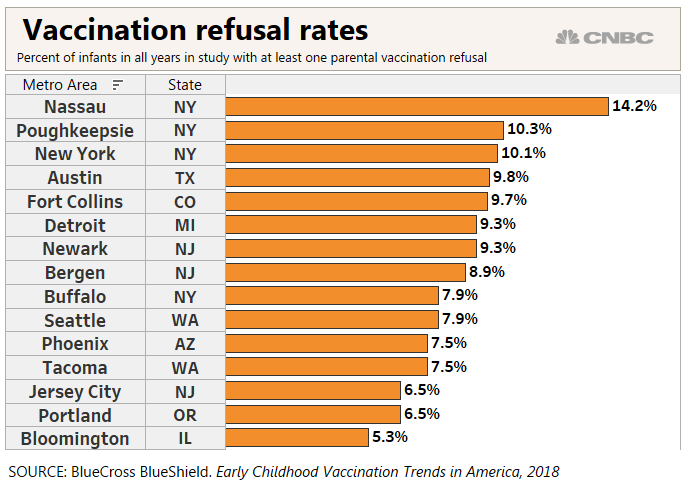Measles continues to spread across the U.S. with outbreaks in four states infecting more people in the first three months of 2019 than all of last year, according to new data from the Centers for Disease Control and Prevention.
The CDC has confirmed 387 cases across 15 states from Jan. 1 through March 28, compared with 372 cases all last year. The health agency updates the statistics weekly. There are now six outbreaks, defined as three or more cases, across four states: New York, Washington, New Jersey and California, according to the CDC.
This year is shaping up to be the worst year for measles since at least 2014 and is already the second-worst since the virus was declared eradicated from the U.S. in 2000. Measles has been making a comeback as parents increasingly refuse to vaccinate their children and unvaccinated travelers bring back the disease from other countries. In 2014, there were 667 confirmed cases, according to the Centers for Disease Control and Prevention.
New York's Rockland County last week took the extraordinary step of banning unvaccinated children from public places such as schools, restaurants, malls and places of worship. There have been 157 confirmed cases of measles in the county, with the overwhelming majority of people having not received the measles, mumps and rubella (MMR) vaccine, according to the county.

Cheryl Healton, dean of New York University's College of Global Public Health, said she has some sympathy for the county health department in taking this action. However, she worries it could embolden parents who refuse to have their children vaccinated, known as anti-vaxxers.
"It's a carrot or a stick. They chose the stick. There's a lot of evidence the carrot works better than when you use the stick, that's why it's not used. You can get a better response by appealing to people's higher nature," she said.
The MMR vaccine, which protects against measles, mumps and rubella, is the best way to protect against measles. Two doses, the recommended amount, provides 97 percent protection against measles. Yet some parents refuse to vaccinate their children, citing religious reasons or false information that vaccines cause autism.
Measles is highly contagious, infecting up to 90 percent of unvaccinated people who are exposed to it, according to the Centers for Disease Control and Prevention. The virus can live in the air for up to two hours after an infected person coughs or sneezes, according to the CDC, meaning people can be exposed to it without ever knowing. People can be infected for days before showing signs of the virus, such as a fever, runny nose or a rash.
Measles can be especially dangerous for young children, the CDC says. It can lead to pneumonia, brain swelling and even death. The CDC recommends children get their first dose MMR vaccine at between 12 and 15 months old and a second dose when they're between 4 and 6 years old.
The CDC says the current measles outbreaks in the U.S. are mostly linked to people traveling internationally to countries like Israel and Ukraine that are experiencing large outbreaks. It's spreading quickly in close-knit religious communities, such as New York's Orthodox Jewish community, where many people choose not to get vaccinated.
Public health officials are desperately trying to assure parents that vaccines are safe and are the best way to protect their children from dangerous and potentially deadly diseases like measles. The anti-vaxxing movement, which advocates against vaccination, has been pushing now debunked studies that falsely suggested there was a link between vaccines and autism.
Most recently, a study of more than 650,000 children from 1999 to 2010 found no link between autism and the MMR vaccine.
from Top News & Analysis https://ift.tt/2OASpqHvia IFTTT
No comments:
Post a Comment